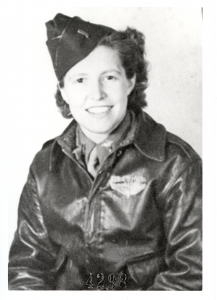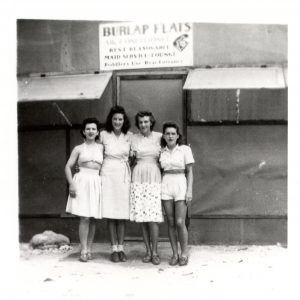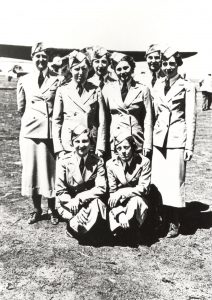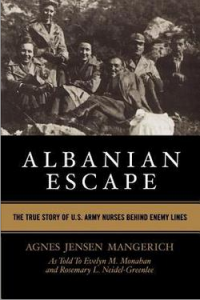Personal Reflections on Coping with War
Part 8 When Flying Was Not Smooth
For the 25 flight nurses interviewed for Beyond the Call of Duty: Army Flight Nursing in World War II, wartime service was beset with potentially difficult circumstances that could exact a toll on even the most hardy of nurses. To cope with these professional and personal challenges, these women drew on many sources of support, tangible and intangible, physical and mental. Social support, one’s physical condition, and abilities and skills fostered in nurses’ training all helped the flight nurses cope behaviorally with the multiple demands of the war. Reasonable expectations, devotion to duty, an optimistic outlook, and faith in one’s God, one’s colleagues, and one’s self all helped them cope emotionally with the war.
Youth, naiveté, and a trusting nature helped flight nurses cope when flying was not smooth. Ethel Carlson of the 815 Medical Air Evacuation Squadron (MAES) assigned to England remembered an unusual flight to the Continent in a plane transporting hand grenades and gasoline for Patton’s troops.
And that was strictly not according to Hoyle, but I think we just didn’t think about it. We did what we were told to, and besides that, we figured somebody was taking care of us. They wouldn’t get us in trouble. You know, we had a chief nurse and a Major Traub was in charge of the squadron, and we had our flight surgeon, and all of those people were going to take care of us. They weren’t gonna get us into any trouble. Besides that, if it was necessary, that’s what we were doing. I think it was a different way we lived, too, in those war years, because everybody was totally involved. It wasn’t a question of whether you wanted to volunteer for military service. The men were drafted, but everybody did what they could. And if your training put you in a spot like being in the Army Nurse Corps, this is where you went. You weren’t being terribly patriotic, but yet you were. It was the thing to do.
Ethel Carlson [Author’s Private Collection]
Flight nurses often were often during air evacuation flights, but they kept their fears to themselves in order to project calmness to their patients One nurse assigned to the Pacific front never did conquer her fear of flying: “I was petrified of flying. I was scared to death to fly. I was scared on every trip. The smooth trips, which were few and far between, were fine; they didn’t bother me. But the minute we started bouncing around, I thought, How am I going to get these forty patients into life rafts? … I think I prayed harder and longer through those years of flying than I have ever done in my life.”
Blanche Solomon, who flew with the 822 MAES, then the 830 MAES on the North Atlantic run, worried about a large patient in a spica cast on a flight from Bermuda to Miami when her the plane with 28 litter patients on board encountered “an awful storm.”
I mean, lightning was hitting all around, the plane was bouncing and such, so the pilot said he was going to try to head into the Bahamas into Nassau. I imagine they had an airfield there. And he still couldn’t fight the storm. So he fooled round with that for a while, and he decided he was heading back to Bermuda. Well, by that time we were beyond the point of no return. So that’s when I was thinking about that one patient.
She knew that the other patients could get out of the plane if necessary. Blanche talked to the navigator about the procedures for ditching and getting the patients out in the life rafts, all the while worrying about the patient in the spica cast. “And, anyhow,” she continued, “we got into Bermuda. All the crash boats were out, the crash trucks were out. We had about fifteen minutes worth of gas left — that’s what they told me, anyhow.”
Carlson remembered another flight from England across the Channel to France on a cargo plane to pick up patients after D Day. She was napping on top of cargo – probably hand grenades – when the plane lurched, tossing her into the air, resulting in a bruised side. She was angry at the pilot “for doing something stupid” that caused her to hurt herself. Even after she found out he was avoiding enemy fire, she still blamed him for being in the wrong place at the wrong time. She didn’t even think about being shot down.
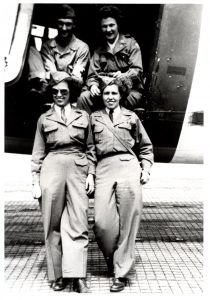 Ethel Carlson (bottom right) with members of 815 MAES
Ethel Carlson (bottom right) with members of 815 MAES
[Author’s Private Collection]
Said Lee Holtz in the Pacific with the 801 MAES about wartime service, “We never realized the danger of it. That never entered our mind.” As Dorothy White, who flew with the 807 MAES in the Mediterranean, explained, she and her colleagues were young, cocky, and ready to tackle the world. “So there was a war going on,” she quipped, “it just kind of got in the way.”

